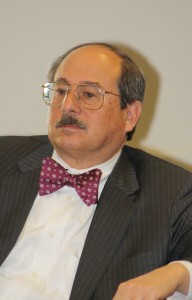By Dave Workman | Senior Editor
In a historic move, gun rights and gun industry groups have joined forces in a lawsuit against the City of Seattle’s new ordinance that puts a tax on the sale of firearms and ammunition inside the city, just three days after anti-gun Mayor Ed Murray signed the ordinances.
The Second Amendment Foundation, National Rifle Association and National Shooting Sports Foundation, joined by two of the city’s firearms retailers – Outdoor Emporium and Precise Shooter LLC – and two private citizens, filed their lawsuit in King County Superior Court.
Representing the plaintiffs are attorneys Steven W. Fogg and David B. Edwards with Corr Cronin Michelson Baumgardner Fogg & Moore. Fogg earlier represented SAF, NRA and other groups in the successful 2009 lawsuit against Seattle which also forced the city to comply with the state preemption act.
There is a strong parallel between the 2009 case and this one. Then-Mayor Greg Nickels pushed a ban on firearms in city park facilities as an administrative rule, rather than an ordinance. At that time, SAF and NRA were joined by the Citizens Committee for the Right to Keep and Bear Arms (CCRKBA), the Washington Arms Collectors and five private citizens, accusing the city of violating the 33-year-old preemption law that places sole authority for firearms regulation in the hands of the State Legislature.
This new legal action sets a precedent. It is the first time that SAF and NRA have been joined by NSSF in a legal action. SAF founder and Executive Vice President Alan Gottlieb told Examiner that he is delighted to team up with NRA again and also have the strong industry representation that NSSF provides because this new tax amounts to a direct slap at firearms retailers inside the city.
Gottlieb noted that the tax would be passed on to consumers, so it is ultimately individual gun and ammunition buyers who will bear the cost, set at $25 per firearm and five cents for each round of centerfire ammunition. The tax on rimfire ammunition is two cents per cartridge. That still places Seattle gun retailers at a financial disadvantage, and they fear it will drive customers out of the city, thus depriving them of business and income.
City Council President Tim Burgess has estimated that this tax could raise anywhere from $300,000 to $500,000 with which the city believes it will fund some gun control efforts. Burgess sponsored the legislation, which passed unanimously. Critics say that it more likely will have a negative effect by driving gun and ammunition buyers to retailers outside the city, and perhaps even force Seattle firearms dealers to leave the city. That would result in a revenue hole and literally no funding for its gun control programs, they argue.
“Over and above the fact that we’re once again defending state preemption,” Gottlieb said in a prepared statement, “we’re battling what amounts to a poll tax on gun owners and retailers. That simply cannot be allowed to stand.”
No matter how the city tries to justify this tax, or explain it, Gottlieb said it is “still a gun control law and it violates Washington’s long-standing preemption statute.” But that seems to be exactly what the city is up to, regardless under what guise it is presented to the public. The parks gun ban was also an attempt to weaken state preemption, but as it turned out, Seattle’s loss actually strengthened the statute by proving it has teeth.
Washington’s preemption law, first adopted in 1983 and strengthened in 1985, has been something of a model for several other similar laws. Such statutes are aimed at creating uniformity across a state, so that someone from one place doesn’t run afoul of a law in another part of his or her state.
The law prevents cities and other local governments from establishing their own peculiar regulations, setting themselves up essentially as city-states. Seattle’s liberal municipal government has long sought to erode the preemption law.
Almost immediately after Murray signed the new tax, and a second ordinance requiring gun owners to quickly report gun losses or thefts to police, the gun prohibition lobbying group Washington Alliance for Gun Responsibility was crowing and asking for money in an e-mail blast. WAGR is seeking contributions to a legal defense fund, presumably to help finance a move to interject themselves into the lawsuit as defendants, as they did when SAF sued the state over provisions of Initiative 594, the 18-page gun control measure passed in 2014 as a so-called “universal background check” measure.




